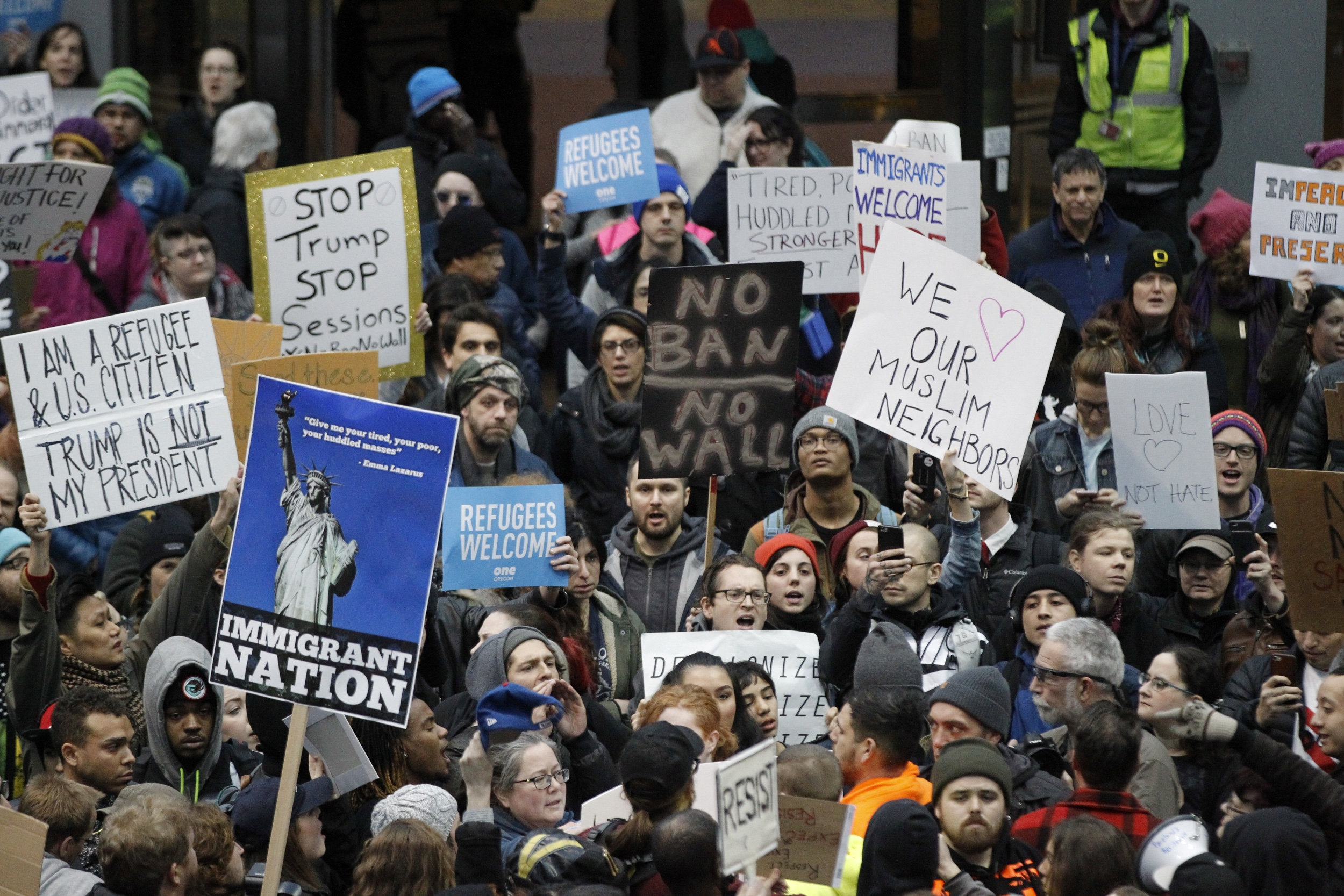 Activists gather at Portland International Airport on Jan. 29. Photo by Steve Dipaola
Activists gather at Portland International Airport on Jan. 29. Photo by Steve Dipaola Like most Jews whose family history features flights from persecution, I have a soft spot for refugees, the “huddled masses yearning to breathe free” welcomed to our shores by Emma Lazarus’ famous poem engraved on the pedestal of the Statue of Liberty. But there have always been those who felt differently.
President Donald Trump’s recent executive order suspending the State Department’s Refugee Assistance Program and restricting visa entry from seven Muslim-majority countries is one in a long line of racist, anti-immigrant measures, from the Naturalization Act of 1790 (limiting naturalization to whites) and Chinese Exclusion Act of 1882 (prohibiting Chinese laborers) to the Immigration Act of 1924 (enacting national origin quotas to reduce the number of Jews and Italians, and exclude Arabs and Asians), which have influenced our immigration policies up to the present day. As President Harry S. Truman said in vetoing the similarly problematic Immigration and Nationality Act of 1952, “In no other realm of our national life are we so hampered and stultified by the dead hand of the past, as we are in this field of immigration.” Congress overrode his veto. President John F. Kennedy was so disturbed by the racist and discriminatory nature of our immigration laws that he even wrote a book about it, “A Nation of Immigrants,” in which he warned that “emotions of xenophobia — hatred of foreigners — and of nativism — the policy of keeping America ‘pure’ … continue to thrive.”
Trump campaigned largely on xenophobic rhetoric aimed at Latinos, Asians and Muslims, here and abroad. For example, on Nov. 6, just days before the election, he called the community of 25,000 Somali refugees in Minnesota a “disaster,” and promised not to admit more refugees without the approval of the community. It is therefore hardly surprising that the new president used his broad executive authority to stop admitting refugees and restrict entry to the United States by individuals from countries like Somalia, which he believes may be sources of radical Islamic terrorism. I expect there will be many more of these types of orders in the days to come, and, in my view, the president likely will succeed in implementing these policies.
To be sure, Trump’s first executive order on immigration has caused a great outcry, even among those who generally support strong anti-terrorism efforts, mainly because it was so poorly conceived and executed. In just the first days, hundreds of travelers were caught in limbo, and attorneys working over the weekend obtained a temporary stay of certain elements of the order, some of which, like the refusal of entry to valid green card holders, may have already been retracted by the administration. There seem to be no exceptions made for properly vetted visitors, including students or scientists attending conferences on tourist visas, or even people who have assisted our armed forces. No doubt there will be protracted litigation over some of the more objectionable parts of the order, such as the instruction to prioritize refugee claims made by members of “a minority religion” (i.e., Christians). Singling out seven countries might also run afoul of the Immigration and Nationality Act of 1965, which barred discrimination against immigrants (but not visitors) on the basis of national origin (unless permitted by Congress). But the upshot is that Trump is pulling up the welcome mat. The huddled masses are no longer going to be welcome. That is the message he is sending to his constituents, and to those living abroad.
Rather than focus on the legality of Trump’s executive order, which has already disrupted the lives of thousands of people, we should be focusing on the underlying policy issue. Is this the country that we want to be? Do we really want to admit no students, no scientists, no tourists, no visiting family members, no artists, no musicians, and no skilled employees from these seven countries? What exactly was wrong with the existing vetting procedures? Why were these seven countries chosen, and not others, such as Saudi Arabia, with a history of exporting terrorists to our shores? A strict reading of the executive order would bar any non-American citizen “from” Iran from obtaining a tourist visa, meaning that many of the relatives of our Persian Jewish community living abroad in Israel or Europe can no longer come to visit. Does that make anyone safer?
With regard to refugees, there is an even more fundamental question. Should we close off our country to even the most persecuted refugees? There are thousands of refugees, families with children, who have been waiting for years while their applications were vetted and who now are blocked. Some argue that we need to set up high barriers to entry to prevent terrorists from entering the country. Almost 80 years ago, when the United States faced a far greater threat than we do today, and Jews were the ones clamoring to get in, Americans made the same argument. “How do we know there won’t be Nazi spies among the refugees?” they asked. Assistant Secretary of State Breckinridge Long ordered all consular officials “to put every obstacle in the way” to delay and stop granting visas to Jewish refugees. As a result, 90 percent of the quota spots were left unfilled, and the Jews trapped in Europe, our relatives, were murdered.
I see little or no difference between the “America First” policy of President Trump, and the similarly named nativist policy that informed Breckinridge Long. We can do better, I think, than defying our own principles in the name of security.
RANDY SCHOENBERG is an attorney and a law lecturer at USC.






















 More news and opinions than at a Shabbat dinner, right in your inbox.
More news and opinions than at a Shabbat dinner, right in your inbox.